The new “three noes” proposed by former president Ma Ying-jeou (馬英九) have hurt Taiwan’s sovereignty and sent the wrong message that China’s bullying of Taiwan is effective, President Tsai Ing-wen (蔡英文) said yesterday.
“Ma’s remarks were very inappropriate and gave people the feeling he is trying to hold them back,” Tsai said after attending a meeting for Industry Day in Taipei.
Tsai was referring to the “three noes” — no ruling out the possibility of unification with China, no support for Taiwanese independence and no use of force — put forth by Ma at a forum on Wednesday that marked the three-year anniversary of his summit with Chinese President Xi Jinping (習近平) in Singapore.
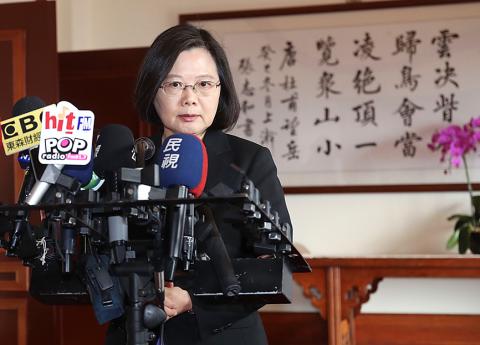
Photo: CNA
When Ma met with Xi, many in Taiwan questioned whether he insisted on the “different interpretations” part of the so-called “1992 consensus” when he spoke to Xi, Tsai said.
The “1992 consensus” — a term former Mainland Affairs Council chairman Su Chi (蘇起) admitted making up in 2000 — refers to a tacit understanding between the Chinese Nationalist Party (KMT) and the Chinese Communist Party that both sides acknowledge there is “one China,” with each side having its own interpretation of what “China” means.
In the public portion of the Ma-Xi meeting, Ma only mentioned the “one China” part of the consensus, but said he raised the “different interpretations” part in their private meeting.
Three years after that meeting, the new “three noes” proposal represents an even greater compromise toward China, Tsai said.
“It seriously hurts Taiwan’s sovereignty and sends a wrong message to the international community that Taiwan will yield to Chinese suppression at a time when China has spared no effort to bully Taiwan,” she said.
China has used every means to suppress Taiwan, including buying its diplomatic allies, depriving it of its right to take part in international activities, sending military jets and vessels to encircle Taiwan, and by spreading fake news to create conflict, Tsai said.
“At such a time, Taiwanese need to be united in facing external perils,” she said.
Ma, as a former president, has an unavoidable responsibility to uphold the nation’s sovereignty, she added.
Tsai also challenged the KMT, of which Ma is a member, to voice its opinion of Ma’s proposal and urged it to stand on the side of Taiwanese in upholding the nation’s sovereignty.
Responding to Tsai’s charges, Ma’s office said that Tsai had made “an ostentatious show with pompous remarks” on the issue.
“Tsai was clearly aiming to rally support for the [Nov. 24] election campaign. She was manipulating public sentiment and purposely distorted the content of Ma’s speech. It is not a demeanor befitting our nation’s leader and we regret that she did so,” the office said in a statement.
“Tsai should focus on how to solve the [nation’s] economic problems and respond to the public’s needs. She should not stir up the contentious issue of unification versus independence to sow discord and tear Taiwanese society apart, all because she and her party have found that the election campaign is not going their way,” it added.
Tsai has falsely accused Ma of surrendering the nation’s sovereignty, “but Ma is no longer the president and right now it is the DPP that is the ruling power in government, the legislature, and holds sway in most local governments, so how can Ma surrender our sovereignty?” it said.
The DPP is obviously trying to salvage its election prospects by stirring conflict through the old unification versus independence issue, KMT spokesman Hung Meng-kai (洪孟楷) said.
“Tsai and her entire ruling party have resorted to the old ways, using the same old tactics to save their flailing election campaign,” he said.
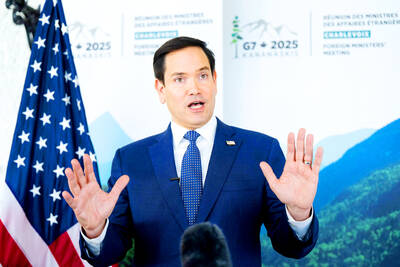
‘CROWN JEWEL’: Washington ‘can delay and deter’ Chinese President Xi Jinping’s plans for Taiwan, but it is ‘a very delicate situation there,’ the secretary of state said US President Donald Trump is opposed to any change to Taiwan’s “status quo” by force or extortion and would maintain that policy, US Secretary of State Marco Rubio told the Hugh Hewitt Show host on Wednesday. The US’ policy is to maintain Taiwan’s “status quo” and to oppose any changes in the situation by force or extortion, Rubio said. Hewitt asked Rubio about the significance of Trump earlier this month speaking with Taiwan Semiconductor Manufacturing Co (台積電) chairman C.C. Wei (魏哲家) at the White House, a meeting that Hewitt described as a “big deal.” Asked whether the meeting was an indication of the
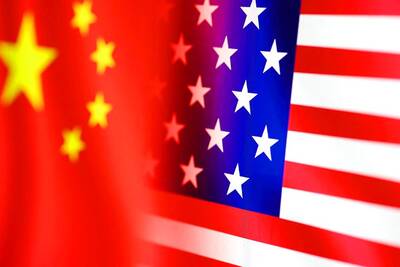
‘RELATIVELY STRONG LANGUAGE’: An expert said the state department has not softened its language on China and was ‘probably a little more Taiwan supportive’ China’s latest drills near Taiwan on Monday were “brazen and irresponsible threats,” a US Department of State spokesperson said on Tuesday, while reiterating Washington’s decades-long support of Taipei. “China cannot credibly claim to be a ‘force for stability in a turbulent world’ while issuing brazen and irresponsible threats toward Taiwan,” the unnamed spokesperson said in an e-mailed response to media queries. Washington’s enduring commitment to Taiwan will continue as it has for 45 years and the US “will continue to support Taiwan in the face of China’s military, economic, informational and diplomatic pressure campaign,” the e-mail said. “Alongside our international partners, we firmly
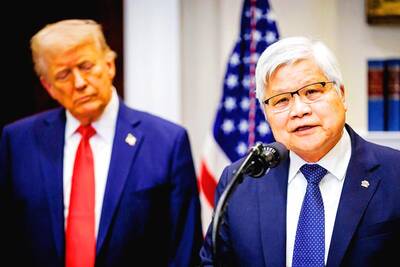
KAOHSIUNG CEREMONY: The contract chipmaker is planning to build 5 fabs in the southern city to gradually expand its 2-nanometer chip capacity Taiwan Semiconductor Manufacturing Co (TSMC, 台積電), the world’s biggest contract chipmaker, yesterday confirmed that it plans to hold a ceremony on March 31 to unveil a capacity expansion plan for its most advanced 2-nanometer chips in Kaohsiung, demonstrating its commitment to further investment at home. The ceremony is to be hosted by TSMC cochief operating officer Y.P. Chyn (秦永沛). It did not disclose whether Premier Cho Jung-tai (卓榮泰) and high-ranking government officials would attend the ceremony. More details are to be released next week, it said. The chipmaker’s latest move came after its announcement earlier this month of an additional US$100 billion
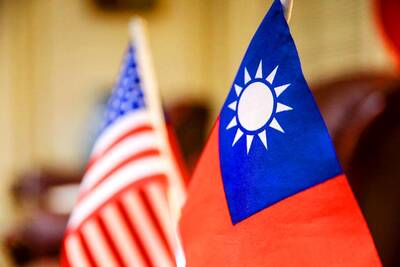
COUNTERING THE PLA: While the US should reinforce its relations with partners and allies, Taiwan must invest in strengthening its defenses as well, Phillip Davidson said If influence in the Indo-Pacific region is one of the US’ core interests, then Taiwan serves as a cornerstone of US economic and security influence in the region, former US Indo-Pacific Command commander admiral Phillip Davidson said on Thursday. “China’s ... strategy is to supplant the US leadership role in the international order ... and they’ve long said ... that they intend to do that by 2050,” Davidson told the National Review Institute’s Ideas Summit in Washington. Davidson said he had previously told US Senate hearings on China’s military activities and possible threats in the Indo-Pacific region that a Chinese invasion of